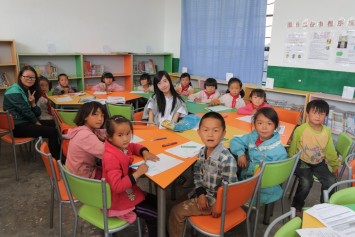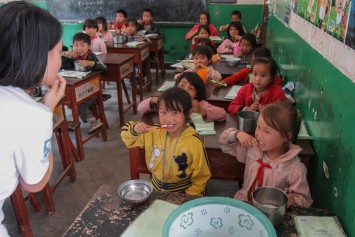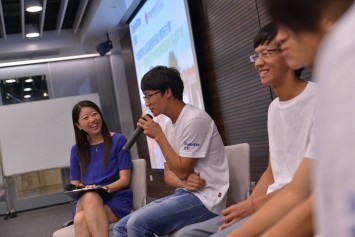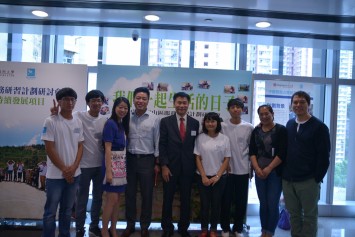Lingnan University and Deloitte China see fruitful conclusion of 7-year Service-Learning project in Yunnan
A service-learning project in Yunnan province of China co-organised by the Office of Service-Learning of Lingnan University and Deloitte Touche Tohmatsu has drawn to a close. More than 70 Deloitte China staff, Lingnan students and alumni who have participated in the project attended the closing seminar at the Youth Square in Chai Wan on 9 August to share their experience and project results. Dr Joseph Lee, Chairman of the Committee on the Promotion of Civic Education, Mr Karon Wan, Managing Partner (Public Sector) of Deloitte China and Prof Stephen Chan, Associate Vice-President (Academic Affairs) and Registrar of Lingnan University were invited to attend as the officiating guests.
Launched in 2007, the “Village Adoption Project in Yunnan, China” was the first service-learning project for the mountainous areas in China co-organised by a tertiary institute and a business enterprise in Hong Kong. Over the past seven years, more than 300 staff members from Deloitte China offices, students of Lingnan and Yunnan University and individual voluntary workers had paid regular visits to the villages of Zhanggela and Wanyaoshu in the remote corners of Yunnan. They conducted field trips, household visits and questionnaire surveys and held discussions with the village chiefs and government officials, in order to understand the actual needs of the villagers and come up with development plans through mutual agreement. On the premise of preserving the unique ethnic cultures of the villages, enhancements were made in education, healthcare, economic development and infrastructure as follows:
- Student dormitories were built, enabling students living afar to live on campus;
- School libraries were renovated, new titles were added and reading classes were introduced to promote reading;
- Scholarships were set up to support outstanding students to pursue further studies;
- Teachers’ training was enhanced, teaching equipment such as laptop computers were donated to improve quality of education;
- Health surveys and body check-ups were conducted, health ambassadors were trained to promote healthcare information and raise health awareness among the villagers;
- Students were taught to brush their teeth every day for better oral health;
- Health education classes were introduced to promote health information and strengthen self-care capabilities;
- Running water pipes were built to improve environmental and food hygiene;
- Roads were re-built for better transportation;
- Planting of walnut trees to promote diversification of industries;
- Women of the Yi ethnic group were encouraged to make handicrafts for sale to increase household income.
Speaking at the ceremony, Mr Karon Wan, Managing Partner (Public Sector) of Deloitte China, said, “The second phase of the Village Adoption Project in Yunnan, China has been completed with great success. We hope the project impact can be prolonged in two aspects. Firstly, villagers can utilise the hardware set up with the project, including the student dormitories and piped water system. Secondly, all the participants from Deloitte China and Lingnan University can learn how to serve society and continue to help the needy in rural China and those around us.”
In his address, Prof Stephen Chan, Associate Vice-President (Academic Affairs) and Registrar of Lingnan University, said, “Service-learning combines academic study and community service, through which students develop critical thinking and self-reflection in order to consolidate what they have learned in class. The Village Adoption Project in Yunnan, China is a great example of this. When serving in the mountainous region, sociology students participated in social research and data collection for analysis of the situation in the rural villages. English students taught the village children English, presenting them with an opportunity to rise from poverty through education. Marketing students developed marketing strategies for the women’s handicrafts to help them earn their living and increase household incomes. Students from different disciplines could apply their knowledge from class to the service project to improve the villagers’ livelihood.”
President Leonard K Cheng of Lingnan also attended the dinner following the seminar. He thanked Deloitte China’s support to the service-learning project over the past years, and applauded Lingnan students’ active participation, which was a great testimony to the University’s motto “Education for Service”. “No Lingnan student or Deloitte staff who had completed their service in Yunnan came home without being touched by experiencing the meaning of life and the preciousness of resources. I hope all of you would transform this deep feeling into actions in the future, influence the lives of others with yours, and continue to think about what we can do to help the impoverished villages in remote areas,” he said.
An exhibition on sustainable development of rural China is also being held at the Youth Square in Chai Wan until 31 August. Members of the public are welcome.
For details of the Village Adoption Project in Yunnan, China, please visit: http://www.ln.edu.hk/osl/YunnanClosingBooklet-print.pdf (Chinese only).





